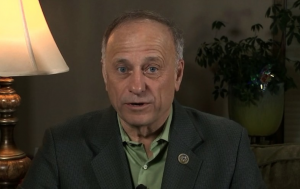
(CNN photo)
“In 2016, I authored language which prohibits the executive branch from including either immigration or climate change provisions in trade agreement negotiations,” said King. “These provisions were signed into law by Barack Obama. The Constitution places authority over immigration in the legislative branch, not in the executive. It is important to remind our USTR that Congress is dedicated to the preservation of these provisions, and that Speaker Ryan and I are in full agreement on the topic.”
Text of Letter:
August 14, 2017
The Honorable Robert E. Lighthizer
United States Trade Representative
Office of the United States Trade Representative
600 17th Street NW
Washington, DC 20508
Dear Ambassador Lighthizer:
With the first round of negotiations for the North American Free Trade Agreement (NAFTA) between the United States, Canada and Mexico scheduled to be held in Washington, D.C. from August 16th through the 20th, I write to express my concerns that the proposed agreement includes provisions related to U.S. immigration laws, particularly any provision obligating the United States to grant access or to expand access to visas issued under section 101(a)(15) of the Immigration and Nationality Act (8 U.S.C. 101(a)(15)).
As you know, under NAFTA, the TN nonimmigrant classification permits qualified Canadian and Mexican citizens to seek temporary entry into the United States to engage in business activities at a professional level. Such professionals include accountants, engineers, lawyers, pharmacists, scientists, and teachers—excellent positions that could be filled by American citizens, providing opportunity and advancement for individuals, economic security for families and a lessening welfare burden on the Americans taxpayer.
I understand that the Administration is renegotiating NAFTA under trade promotion authority (TPA), which is also known as fast-track authority. TPA allows President Trump wide authority to independently broker a trade agreement before submitting it to Congress for a vote that can be approved or denied, but not amended or filibustered. Particularly considering this process, it is important to ensure that the Article I Constitutional authority given to the United States Congress alone to establish immigration law is respected through the renegotiation.
It is essential to our duties under the law that the representatives of the people ensure that such policy is not being written through trade agreements negotiated by the Executive Branch. This is a long-held view of the Legislative Branch. In 2005, bipartisan letters from both the Senate and House Judiciary committees were sent to USTR, expressing the view of the chambers that immigration policy in trade agreements is unconstitutional, limiting Congress’s ability to debate, amend, and later modify the immigration provisions.
The Trade Facilitation and Trade Enforcement Act of 2015 passed both chambers of Congress and was signed into law on February 24, 2016. Language that I offered was included in Section 914 of the law, PL 114-125, and states that:
‘‘(14) to ensure that trade agreements do not require changes to the immigration laws of the United States or obligate the United States to grant access or expand access to visas issued under section 101(a)(15) of the Immigration and Nationality Act (8 U.S.C. 1101(a)(15)).’’The effect of this language is that trade agreements cannot require changes to U.S. immigration laws. Specifically, the effect of this language is that any provision in new trade agreements that would obligate the United States to grant or expand access to visas would not be consistent with the negotiating objectives in the Bipartisan Congressional Trade Priorities and Accountability Act. If visas are included in NAFTA, the remedy is moving a Consultation and Compliance Resolution under the Act through the Ways and Means Committee through litigation.
I request an explanation of your position on visas in the renegotiation of NAFTA. Furthermore, I urge you to consider the illegality of a NAFTA renegotiation that violates the dictates of the Trade Facilitation and Trade Enforcement Act of 2015 by requiring changes to U.S. immigration laws.
Sincerely,
Steve King (IA-04)
Member of Congress








